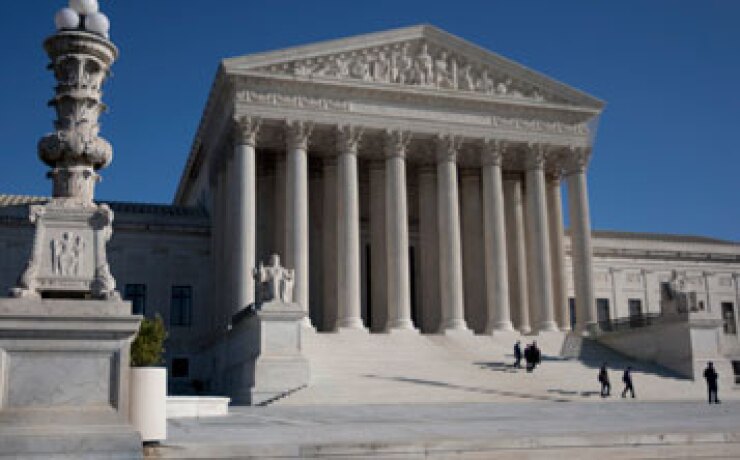
The Supreme Court Thursday nullified a nationwide injunction on enforcement of a law which requires business owners to register their information with the Treasury's financial crimes unit to combat illicit financial activity by shell companies, known as the Corporate Transparency Act.
The ruling grants a government request from December to strike down a nationwide injunction issued by a federal judge in the case Texas Top Cop Shop, Inc. v. Garland. However, a separate injunction from a different Texas judge in Smith v. Department of the Treasury remains in effect. All reporting companies are not currently required to file information and will not face liability for failure to file beneficial ownership information according to Fincen's website.
The court's decision — issued in an unsigned order — blocks a nationwide injunction issued by District Judge Amos Mazzant of the Eastern District of Texas, which had ruled the law is likely unconstitutional. An unsigned Supreme Court ruling — also called a per curiam decision — is issued by the collective court, with no single justice named as the author. Per curiam rulings are usually short and meant to dispense with uncontroversial issues.
The Supreme Court has been
In the case of Texas Top Cop Shop v. Garland, Judge Mazzant sided with businesses challenging the CTA, saying the law imposes burdensome compliance costs and violates companies' First and Fourth Amendment rights, the former of which protects Americans' freedom of speech, religion, press, assembly and right to petition the government, while the latter safeguards against unreasonable searches and seizures, requiring warrants based on probable cause.
Following Mazzant's ruling, U.S. Solicitor General Elizabeth Prelogar urged the Supreme Court to allow enforcement, emphasizing the law's importance in combating financial crimes and bolstering U.S. efforts to promote global transparency standards.
The law,
While financial institutions and anti-corruption advocates
In Thursday's ruling, Justice Ketanji Brown Jackson dissented to the question of staying the nationwide injunction, noting the case currently being considered by the 5th Circuit Court of Appeals is moving quickly, with arguments scheduled for March 25. Jackson questioned whether the government had demonstrated imminent harm from delay of the CTA's enforcement.
While Justice Neil Gorsuch supported Thursday's decision to pause the lower court's injunction, he suggested the court should rule on the broader issue of nationwide injunctions in the future.
Anti corruption advocates like Scott Greytak, director of advocacy for Transparency International U.S., welcomed the Supreme Court's decision, saying the elimination of a barrier to the law's enforcement puts pressure on criminals that use anonymous companies to launder the proceeds of their illegal activities.
"Nearly 85% of all countries in the world have committed to collecting beneficial ownership information to protect against abuse of their financial systems … [it] is astonishing that the plaintiffs in this case believe the United States isn't capable of doing the same," said Greytak. "The order from the Supreme Court to stay this injunction should serve as a clear sign to the other courts currently weighing misguided challenges to the CTA that the law is constitutional."
Nate Sibley, fellow and director of Hudson Institute's Kleptocracy Initiative, argued the law passed with bipartisan support and is a vital tool for U.S. law enforcement to take on America's adversaries. Trump vetoed the law originally, though his veto was overridden.
"With 100,000 Americans dying from fentanyl every year, now is the time to be providing law enforcement agents with powerful investigative tools that help them follow drug money," Sibley wrote in an email. "To secure its investment in protecting the U.S. financial system from dirty money, I hope the incoming Administration will again stand with law enforcement and see to the successful implementation of this crucial law."
Joe Lynyak, a partner at Dorsey & Whitney LLP, said the court's ruling means that the Texas Cop Shop lawsuit filed in the 5th Circuit will now proceed in normal order. While the plaintiffs in the 5h Circuit case may ultimately prevail, he says the government's position was supported by two significant principles.
"First, the status of a law as being constitutional is entitled to significant deference when an emergency order of this nature is before the Court — meaning that a high burden is imposed before a lawfully passed statute is overturned without being fully litigated," he wrote. "Second, from a balancing perspective, the disclosure of ownership and control information by a corporate entity should be subordinated to valid U.S. national security needs to prevent money laundering and similar criminal activity."






